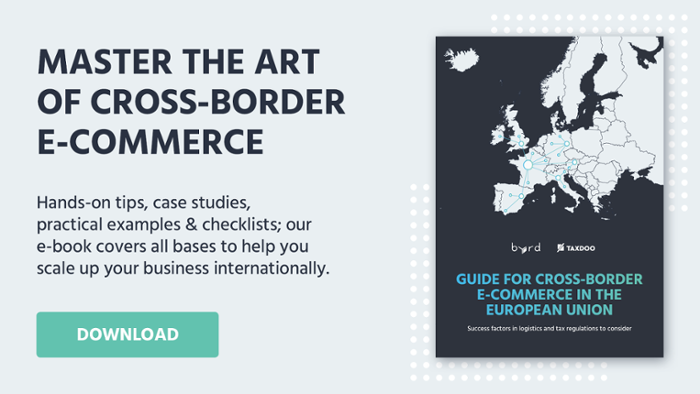A Guide to IOSS: Simplifying VAT for E-commerce Businesses
Table of Content
The world of e-commerce has witnessed tremendous growth over the years, and with it comes the need to navigate complex tax regulations. One such area that has gained significant attention is Value-Added Tax (VAT). In this blog post, we will delve into the Import One-Stop Shop (IOSS), an innovative system designed to streamline VAT compliance for businesses engaged in cross-border e-commerce transactions. We will also explore alternative VAT options and highlight the benefits of IOSS for e-commerce businesses, including those in the United Kingdom post-Brexit.
Understanding IOSS
The Import One-Stop Shop (IOSS) is an EU initiative designed to streamline the collection, declaration, and payment of Value Added Tax (VAT) for goods imported into the EU. Launched on July 1, 2021, IOSS is available for companies worldwide selling goods valued below €150 to customers in EU member states.
How IOSS Works?
Under IOSS, companies can register for a unique IOSS identification number, allowing them to collect and remit VAT at the time of sale. This eliminates the need for customers to pay additional VAT charges upon receiving the goods. The IOSS number acts as a clearance mechanism, facilitating smooth entry into the EU without delays or additional customs processing.

When companies sell products to EU customers, they include the IOSS identification number with the customs declaration, indicating that VAT has already been paid. This expedites the customs process for seamless delivery. IOSS-registered companies file monthly returns and remit the collected VAT to the relevant EU tax authorities.
Benefits of IOSS
- Streamlined VAT Compliance: IOSS enables e-commerce businesses to manage VAT obligations more efficiently by centralizing the declaration and payment processes for all eligible cross-border sales. This reduces administrative complexities, saves time, and helps businesses stay compliant with VAT regulations.
- Enhanced Customer Experience: By using IOSS, businesses can offer their customers a seamless shopping experience, as they can avoid unexpected customs charges and delays at the point of delivery. This leads to higher customer satisfaction and improves overall conversion rates.
- Centralized customs clearance: With IOSS's centralized customs clearance, carriers can clear customs in any chosen country, not just the consumer's home country. This single-country clearance cuts transit delays, enabling faster EU-wide deliveries. It also allows for consolidated air freight rates and guarantees free movement of goods across the EU, enhancing overall logistics efficiency.
Which E-commerce Businesses Benefit from IOSS?
IOSS is particularly beneficial for e-commerce businesses that:
- Engage in cross-border sales to the EU: Businesses selling goods to customers in the EU can leverage IOSS to simplify their VAT obligations and enhance customer experience.
- Deal with low-value consignments: IOSS is specifically designed for goods valued up to €150, making it ideal for businesses that frequently sell low-value products internationally.
Seek efficient VAT compliance: IOSS streamlines the VAT collection and reporting process, reducing administrative burdens and saving time for businesses.
Alternative VAT Options
While IOSS simplifies VAT compliance, it is not mandatory for all e-commerce businesses. There are additional VAT solutions available if a business chooses not to use IOSS, in which case VAT will be collected by customs authorities upon importation.
This approach might be suitable for businesses with higher-value goods or those who prefer not to participate in IOSS due to various reasons.
IOSS and The UK After Brexit
Despite the UK's exit from the EU, many UK businesses still sell goods to customers in EU member states. By utilizing IOSS, UK companies can simplify their VAT compliance process for these cross-border transactions. With IOSS, UK businesses can offer transparent pricing and a smooth purchasing process, leading to increased customer satisfaction and loyalty.
- Competitive Advantage in the EU Market: By leveraging IOSS, UK companies can differentiate themselves from competitors in the EU market. Offering a hassle-free shopping experience with upfront VAT collection and transparent pricing gives them a competitive edge. This advantage is especially valuable when competing against businesses from non-EU countries that may not utilize IOSS.
- Simplified Customs Clearance: IOSS expedites the customs clearance process for UK companies shipping goods to EU customers. With VAT already settled at the point of sale, businesses can avoid potential customs-related delays and complications. This ensures smoother logistics and faster delivery times, which further enhances customer satisfaction.
Compliance with EU VAT Regulations: While the UK has implemented its own VAT rules after Brexit, IOSS allows UK companies to adhere to EU VAT regulations when selling goods to customers in EU member states. This ensures compliance and minimizes any potential barriers or complications related to VAT collection and reporting.
Conclusion
IOSS represents a significant development in VAT compliance for e-commerce businesses involved in cross-border sales. With its ability to streamline VAT processes, enhance customer experience, and improve cash flow, IOSS offers numerous advantages. For UK businesses post-Brexit, IOSS remains a valuable tool to navigate VAT obligations when selling goods to EU customers. By embracing IOSS, e-commerce businesses can stay compliant, improve efficiency, and deliver a seamless shopping experience to their international customers. By working with a 3PL service provider such as byrd you can ensure that all your shipments are sent with the necessary labels and never need to worry about customs clearance again.
